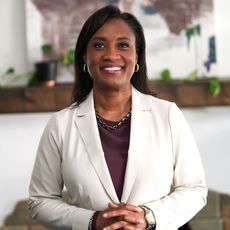LDS and FLDS Are Not the Same!
At a recent dinner party, I sat across from Elita, a single woman (who would have been called an ‘old maid’ in my mother’s generation) who announced that the LDS Church (The Church of Jesus Christ of Latter-day Saints, an American-born worldwide church with 13 million members) and the FLDS Church (the fundamentalist cult of Warren Jeffs fame) are one and the same. After I shut my gaping mouth, I informed Elita that the LDS Church passed a Manifesto outlawing polygamy in 1890, and again in 1904, and that in the 1930’s, 40’s and 50’s the LDS Church actually helped the government gather incriminating information against fundamentalists in attempts to stamp out polygamy. “My people really embarrassed the LDS Church, you know. That’s because they’re really very different,” I told her. Elita shook her head before I could finish speaking and told me again that the LDS and FLDS doctrines indicate that they are one and the same. I had been part of both organizations and could not agree with her. In fact, as I told her, I had personally felt the bite of the LDS Church’s attempts to distance itself from polygamy. So I had to ask Elita where she got her information. She didn’t cite sources, but said she knew that Mormons believe that God will assign single women a husband of His choosing in the hereafter.
At a recent dinner party, I sat across from Elita, a single woman (who would have been called an 'old maid' in my mother's generation) who announced that the LDS Church (The Church of Jesus Christ of Latter-day Saints, an American-born worldwide church with 13 million members) and the FLDS Church (the fundamentalist cult of Warren Jeffs fame) are one and the same. After I shut my gaping mouth, I informed Elita that the LDS Church passed a Manifesto outlawing polygamy in 1890, and again in 1904, and that in the 1930's, 40's and 50's the LDS Church actually helped the government gather incriminating information against fundamentalists in attempts to stamp out polygamy.
"My people really embarrassed the LDS Church, you know. That's because they're really very different," I told her.
Elita shook her head before I could finish speaking and told me again that the LDS and FLDS doctrines indicate that they are one and the same. I had been part of both organizations and could not agree with her. In fact, as I told her, I had personally felt the bite of the LDS Church's attempts to distance itself from polygamy. So I had to ask Elita where she got her information. She didn't cite sources, but said she knew that Mormons believe that God will assign single women a husband of His choosing in the hereafter.
"So you believe that an LDS woman in your position would be forced to marry somebody whether you like it or not?" I asked her. She nodded, perfunctorily.
"Whether you like him or not?"
Again she nodded.
"I don't think that's true. From what I know, the LDS people believe in a loving God who wants His children to be happy. I have heard that women who die without an eternal companion are allowed to choose one in the hereafter."
"Well, their Mormon god makes that choice for them. It's in the doctrine," she insisted.
I have long made it a policy not to engage in doctrinal debates, so I didn't say much more. I wondered about this woman's view of God: a heavy-handed patriarch who imposes his will regardless of what women want. I wondered about her father whose firm manner must have born a strong resemblance to her version of God. But instead of prolonging our disagreement, I simply stated facts. "I know this much for sure: LDS is not the same as FLDS. Especially when it comes to polygamy."
She pressed her lips together and shook her head. She devoured her buttered roll, prepared another and devoured it, too. I puzzled about this woman's vehement remarks all the way through dessert. Then, when the host, a handsome and very married man stood to make a toast, I saw the shine in her eyes, a carefully-held secret she would never openly acknowledge, and I knew where her passionate discourse had come from. It was the fruit of wishful thinking. Some of us just don't know how to get what we want so we settle for fantasy instead.
Stay In The Know
Marie Claire email subscribers get intel on fashion and beauty trends, hot-off-the-press celebrity news, and more. Sign up here.
-
 21 Spring Essentials in Madewell, Banana Republic, and Shopbop's Flash Sales
21 Spring Essentials in Madewell, Banana Republic, and Shopbop's Flash SalesDon’t let these can’t-miss sales pass you by.
By Brooke Knappenberger Published
-
 'Shōgun' Is a Masterpiece—Will There Be More Episodes?
'Shōgun' Is a Masterpiece—Will There Be More Episodes?With those ratings, never say never.
By Quinci LeGardye Published
-
 32 Child Stars Who Have Aged Like Fine Wine
32 Child Stars Who Have Aged Like Fine WineThey made the notoriously bumpy transition to adulthood look easy.
By Katherine J. Igoe Published
-
 36 Ways Women Still Aren't Equal to Men
36 Ways Women Still Aren't Equal to MenIt's just one of the many ways women still aren't equal to men.
By Brooke Knappenberger Last updated
-
 EMILY's List President Laphonza Butler Has Big Plans for the Organization
EMILY's List President Laphonza Butler Has Big Plans for the OrganizationUnder Butler's leadership, the largest resource for women in politics aims to expand Black political power and become more accessible for candidates across the nation.
By Rachel Epstein Published
-
 Want to Fight for Abortion Rights in Texas? Raise Your Voice to State Legislators
Want to Fight for Abortion Rights in Texas? Raise Your Voice to State LegislatorsEmily Cain, executive director of EMILY's List and and former Minority Leader in Maine, says that to stop the assault on reproductive rights, we need to start demanding more from our state legislatures.
By Emily Cain Published
-
 Your Abortion Questions, Answered
Your Abortion Questions, AnsweredHere, MC debunks common abortion myths you may be increasingly hearing since Texas' near-total abortion ban went into effect.
By Rachel Epstein Published
-
 The Future of Afghan Women and Girls Depends on What We Do Next
The Future of Afghan Women and Girls Depends on What We Do NextBetween the U.S. occupation and the Taliban, supporting resettlement for Afghan women and vulnerable individuals is long overdue.
By Rona Akbari Published
-
 How to Help Afghanistan Refugees and Those Who Need Aid
How to Help Afghanistan Refugees and Those Who Need AidWith the situation rapidly evolving, organizations are desperate for help.
By Katherine J. Igoe Published
-
 It’s Time to Give Domestic Workers the Protections They Deserve
It’s Time to Give Domestic Workers the Protections They DeserveThe National Domestic Workers Bill of Rights, reintroduced today, would establish a new set of standards for the people who work in our homes and take a vital step towards racial and gender equity.
By Ai-jen Poo Published
-
 The Biden Administration Announced It Will Remove the Hyde Amendment
The Biden Administration Announced It Will Remove the Hyde AmendmentThe pledge was just one of many gender equity commitments made by the administration, including the creation of the first U.S. National Action Plan on Gender-Based Violence.
By Megan DiTrolio Published